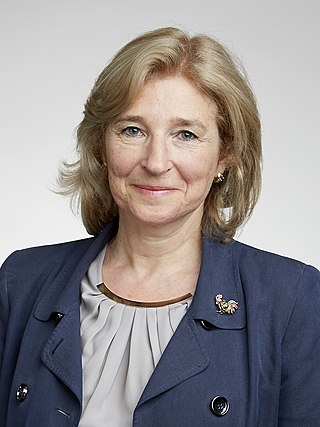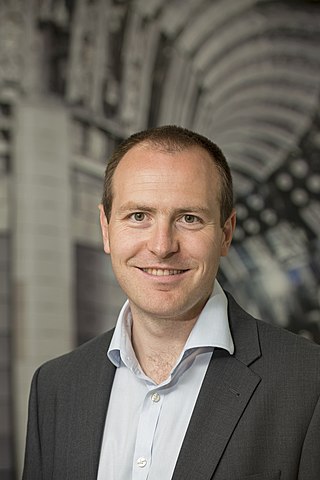
Michele Karen Dougherty is a Professor of Space Physics at Imperial College London. She is leading unmanned exploratory missions to Saturn and Jupiter and is Principal Investigator for J-MAG – a magnetometer for the European Space Agency's Jupiter Icy Moons Explorer, launched in April 2023.

Joanna Dorothy Haigh is a British physicist and academic. Before her retirement in 2019 she was Professor of Atmospheric Physics at Imperial College London, and co-director of the Grantham Institute – Climate Change and Environment. She served as head of the department of physics at Imperial College London. She is a Fellow of the Royal Society (FRS), and a served as president of the Royal Meteorological Society.

Dame Molly Morag Stevens is Professor of Biomedical Materials and regenerative medicine and Research Director for Biomedical Materials Sciences in the Institute of Biomedical Engineering at Imperial College London.

Jenny Nelson is Professor of Physics in the Blackett Laboratory and Head of the Climate change mitigation team at the Grantham Institute - Climate Change and Environment at Imperial College London.

Polina Leopoldovna Bayvel is a British engineer and academic. She is currently Professor of Optical Communications & Networks in the Department of Electronic and Electrical Engineering at University College London. She has made major contributions to the investigation and design of high-bandwidth multiwavelength optical networking.

Alexandra Olaya-Castro is a Colombian-born theoretical physicist, currently a Professor in the Department of Physics and Astronomy at University College London. She is also the Vice-Dean for the Mathematical and Physical science Faculty.

Jonathan Mark Butterworth is a Professor of Physics at University College London (UCL) working on the ATLAS experiment at CERN's Large Hadron Collider (LHC). His popular science book Smashing Physics, which tells the story of the search for the Higgs boson, was published in 2014 and his newspaper column / blog Life and Physics is published by The Guardian.
Jennifer Anne Thomas,, is a British experimental particle physicist and professor at University College London. She has been a pioneer in the development of particle detectors, and the recipient of the Michael Faraday medal and prize in 2018 for her "outstanding investigations into the physics of neutrino oscillations".

Anne Jacqueline Ridley is professor of Cell Biology and Head of School for Cellular and Molecular Medicine at the University of Bristol. She was previously a professor at King's College London.

Sarah (Sally) Lois Price is Professor of Physical Chemistry at University College London.

Hiranya Vajramani Peiris is a British astrophysicist at the University of Cambridge, where she holds the Professorship of Astrophysics (1909). She is best known for her work on the cosmic microwave background radiation, and interdisciplinary links between cosmology and high-energy physics. She was one of 27 scientists who received the Breakthrough Prize in Fundamental Physics in 2018 for their "detailed maps of the early universe."
Marina Galand is an atmospheric physicist and lecturer at Imperial College London. She is the 2018 recipient of the Holweck Prize for her "outstanding contribution to space physics by studying in a comprehensive and original manner the effects of energy sources on planetary atmospheres throughout the Solar System and beyond".
The 1752 Group is a UK-based research and lobby organisation working to end sexual misconduct in higher education.
Lesley Francis Cohen is a Professor of solid-state physics at Imperial College London. She works in magnetic materials for solid-state magnetic refrigeration and spintronic applications. Cohen has served as the editor-in-chief of Applied Physics Letters since 2019.

Jessica Alice Feinmann Wade is a British physicist in the Blackett Laboratory at Imperial College London, specialising in Raman spectroscopy. Her research investigates polymer-based organic light emitting diodes (OLEDs). Her public engagement work in science, technology, engineering, and mathematics (STEM) advocates for women in physics as well as tackling systemic biases such as gender and racial bias on Wikipedia.
Philippa K. Browning is a Professor of Astrophysics in the Jodrell Bank Centre for Astrophysics at the University of Manchester. She specialises in the mathematical modelling of fusion plasmas.

Stanley William Herbert Cowley is a British physicist, Emeritus Professor of Solar Planetary Physics at the University of Leicester.

Sir Ian Trevelyan ChapmanFRS is a British physicist who is the chief executive of the United Kingdom Atomic Energy Authority (UKAEA).
Helen H. Fielding is a Professor of physical chemistry at University College London (UCL). She focuses on ultrafast transient spectroscopy of protein chromophores and molecules. She was the first woman to win the Royal Society of Chemistry (RSC) Harrison-Meldola Memorial Prize (1996) and Marlow Award (2001).

Nguyễn Thị Kim Thanh is a professor of Nanomaterials at University College London. She was awarded the 2019 Royal Society Rosalind Franklin Award for her research and efforts toward gender equality.














